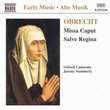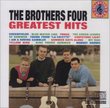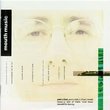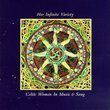| All Artists: Jacob Obrecht, Tallis Scholars, Peter Phillips Title: Obrecht: Missa Maria Zart Members Wishing: 2 Total Copies: 0 Label: Gimell UK Release Date: 11/13/2001 Album Type: Import Genre: Classical Styles: Opera & Classical Vocal, Historical Periods, Early Music Number of Discs: 1 SwapaCD Credits: 1 UPC: 755138103221 |
Search - Jacob Obrecht, Tallis Scholars, Peter Phillips :: Obrecht: Missa Maria Zart
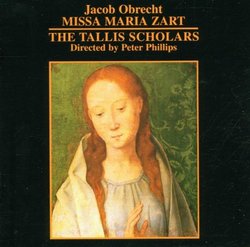 | Jacob Obrecht, Tallis Scholars, Peter Phillips Obrecht: Missa Maria Zart Genre: Classical
|
Larger Image |
CD DetailsSimilar CDsSimilarly Requested CDs
|
CD ReviewsAbsolute masterpiece David Gulbenkian | Lakewood, CO United States | 02/28/2004 (5 out of 5 stars) "When I saw the earlier review which called this "mediocre" I had to write my opinion that this is an absolute treasure. Yes, you have to have learned the Latin of the mass so you can follow every word of the singing. Yes, this is the most drawn-out setting of the text of any mass you've ever heard--it takes a couple of hearings to adjust your expectations to the extremely long dwelling on every word. Yes, you have to be skilled in listening to polyphony. But this is the kind of masterpiece that makes you think about buying an extra CD in case something should happen to your CD. I own half a dozen performances by the Tallis Scholars, and this is my favorite." A landmark recording of the sphinx amongst Obrecht's masses Sator | Sydney, Australia | 06/24/2005 (4 out of 5 stars) "There is little doubt that this recording of the longest Renaissance polyphonic mass is a landmark event of great importance. There is definitely a case to be made for Obrecht as the major figure of the Prima Prattica, with his relationship to Josquin being similar to that between Telemann and Bach. Just as Telemann's reputation completely overshadowed that of Bach's, Josquin's reputation too totally ecclipsed that of Obrecht's - only with Telemann and Bach prosterity has fully overturned the judgement. Perhaps now after five centuries prosperity will bestow a similar favour on Obrecht, who faded into total obscurity after his tragic premature demise on one of his rare excursions out of his Flemish homeland that took him through Innsbruck where he wrote the 'Missa Maria Zart' and onwards into Ferrara. There in Ferrara Obrecht got his break with a dream job working for a true patron of the arts after decades of working under harsh conditions with mediocre pay, only to have his dreams shattered as he was dismissed within months on the death of his employer. Soon after Obrecht tragically succumbed at to the plague - doubtless ministering to plague victims as a priest to sustain an income. Rob Wegman's excellent book on Obrecht is highly recommendable, as both eloquent advocacy and moving bibliography, on behalf of this sorely neglected genius. The Missa Maria Zart is described by Rob Wegman as the sphinx amongst Obrecht's masses. The work is an oddity amongst this composer's mature outputs which are usually far more strongly directional, whereas here Obrecht spins out endless passages of two or three part writing that just to go on and on without a clear goal. In Wegman's words "There is no sense of development, no musical progress: the spinning is the process." Needless to say this can make very extremely difficult and perplexing listening. So strange is this work that some writers have suggested there is some cryptic agenda to explain the composition. The Tallis Scholars can always be depended on to present Renaissance polyphony with its typical Oxbridge sound of brilliant clarity and transparency. Often this can produce highly memorable interpretations. On the other, in this instance, this can even be a barrier to the fullest advocacy on behalf of Obrecht. Most continental reviewers (especially the French) complain bitterly that their Oxbridge approach sacrifices content for form. Christophe Huss - just to give one example - described their sound (...) as a 'perfection glacée' (icy perfection). Their relentless pursuit of a polished sound of perfect textural clarity and intonation can make it even harder for the listener to fully engage in an already difficult work such as the Missa Maria Zart - difficult that is for the listener, as much as for the performer. There is no doubt that their performance has many wonderful things and with time this will become a treasured recording. While this is definitely an essential CD for those with an interest in Obrecht, anyone who wants to hear Obrecht advocated by performers who can communicate their genuinely hearfelt interest in his music should head straight to the recordings by Janos Bali and the ANS Chorus on Hungaraton. Essentially, they choose works that are much more representative of Obrecht and if you want to see why Wegman argues for him being the outstanding composer of this age then you are far better listening to representative works of his maturity like Missa Si Dedero, Alma Redemptoris Mater, or the Missa Malheur Me Bat rather than starting with the Missa Maria Zart. The ANS Chorus have elsewhere recieved glowing reviews such as on Goldberg early music magazine, but also notably by the highly particular Todd McComb of Medieval.org who - unusually for him - gives them a very enthusiastic recommendation. They have a characteristically European sound, similar to the Huelgas Ensemble though perhaps just a hint more English. The way they phrase Obrecht's lines is particular beautiful and the warm of the sound that they bath the listener in comes as a huge relief - it makes falling in love with Obrecht a pleasure rather than an effort. The recorded sound is also a little more atmospheric than the starkly analytical sound typical of the Gimell recordings of the Tallis Scholars (microphones slightly more recessed to capture the ambience of the acoustic). However for those who want to challenge the sphynx and hear this crytic work, until the ANS Chorus record the Missa Maria Zart, the Tallis Scholars will remain the obvious first choice." His Art Surpasses Sound Giordano Bruno | Wherever I am, I am. | 01/22/2010 (5 out of 5 stars) "There's more documentation available about Jacob Obrecht than about almost any other composer of his era, the 15th C... more than about Josquin or Busnois or Ocheghem, his closest peers... and musicologist Rob Wegman has integrated that documentaion into a magnificent interpretive biography, "Born for the Muses." We have ample facts about Obrecht's parentage, about his financial resources, about his travels and career choices, and we also have no less than 30 of his masses more or less intact, along with motets, secular songs, and instrumental carmina. We even have an authentic, life-like portrait of the man. Yet about his personality, I confess, we seem to know nothing at all. His inner being is an abstraction, a mystery. His passion for music is undeniable, but that passion is a kind of Delphic fire, a commitment to Apollonian perfection, to music for music's sake. He became a priest at a remarkaby early age, yet one has no sense of pietistic fervor from him. There's not a whiff of Petrarchian romanticism in even his 'love' songs. In this way, he is the ultimate voice of the Renaissance musical idealism - serene, dispassionate, aloof from human cares and dramas, timeless. And the ultimate expression of musical idealism is his "Missa Maria Zart", the longest, purest, most abstract of all polyphonic masses.
Musicologists suppose that Obrecht composed the Missa Maria Zart during a layover in Innsbruck en route to Ferrera. If so, it would have been his final major composition, and it might have been intended as a 'presentation' piece to the Este court or to other potential Italian patrons. As it happened, Obrecht died of plague within a few months of his arrival in Italy, at the tragically youthful age of 48. Maria Zart is 69 minutes long on this CD, roughly twice the length of any mass by Josquin or Obrecht himself, yet it is composed for only four voices, setting only the five "ordinaries" of the mass without any supplemental texts or antiphons. The 'cantus firmus' is an Austrian devotional song in praise of the Virgin Mary, a melody which was also employed in parody masses by other composers. Obrecht, in his latter compositions, was firmly committed to a kind of perfectionist structuralism, evolving from the arbitrary organum-like 'tenor' of earlier polyphonic masses to a more integrated and integral 'tenor' verging on harmonic modular progressions, virtually a new theory of key and thematic development. Thus Maria Zart is far less florid than the splendid rhythmic cataracts of Ockeghem or Busnois, or earlier Obrecht. The 'tenor' is treated so melodically that one can almost forget its sculptural supportive role. Cadences are neither disguised nor exaggerated for drama. Everything occurs with a timeless musical certainty. To complain that Maria Zart lacks 'excitement' is to see the absence of trees without realizing the endless depths of the forest. In terms of sheer craftsmanship, this is easily one of the greatest accomplishments of Renaissance music. The Tallis Scholars performance, recorded in 1996, is the only one available. It's extremely fine, as polished as any performance the Tallis Scholars ever sang. The eight voices, two on a part throughout, are beautifully balanced, with the two women singing the superius line in genderless clarity. Tuning is flawless, rhythmic ensemble is magnificent, the transparency of the polyphony allows every phrase to be relished in real time, and yet I don't hear this performance as the final word of defining perfection. The music is Apollonian enough, serene enough, without overstating its marble perfection. I find myself wishing that more ardor, more affect, would blossom in passages. Perhaps the dynamics are just a little too restrained and even. I feel an urge to jab Peter Philipps with his own baton, to challenge this crew of topnotch singers to sing it again, taking more risks. I'd love to hear the whole mass sung by other ensembles -- the Orlando Consort one voice on a part, or one of the younger Italian consorts with a truly resonant soloistic basso. Perhaps the recording technology is at fault, but on this CD the journeyman English choral mastery isn't rich enough; the very controlled voices of the Scholars don't sound lovely enough. I hear choristers where I long to hear angels. Nevertheless, this is a mass that must be heard, and heard more than once, and the more often you hear it, the more you'll hear of its sublimity." |

 Track Listings (5) - Disc #1
Track Listings (5) - Disc #1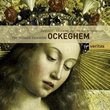

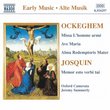
![Jacob Obrecht: Missa de Sancto Donatiano [CD+DVD]](https://nationalbookswap.com/cd//m/23/4423/6194423.jpg)
